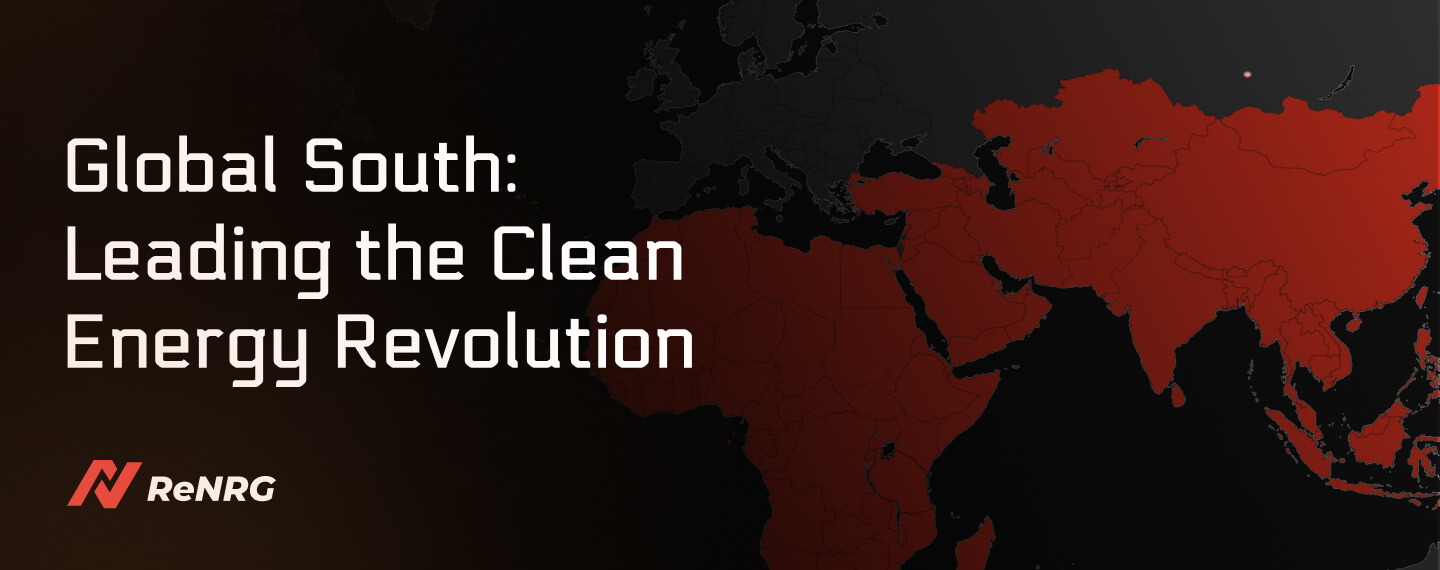Key Takeaways
- Energy demand in the Global South is surging amid rapid growth.
- These regions can leapfrog legacy grids using decentralized renewables.
- Lower tech costs enable scalable clean energy adoption in underserved areas.
- ReNRG leverages tokenization to fund and scale solar infrastructure locally.
The global energy landscape is undergoing a seismic shift, with the Global South encompassing regions like Africa, Latin America, and Southeast Asia, emerging as pivotal players in the clean energy revolution. Contrary to traditional perceptions, these regions are not just passive recipients of energy innovations but are actively leading the charge toward a sustainable future.
The Fastest-Growing Energy Markets Aren’t Where You Think
While developed nations have historically dominated energy consumption, the tide is turning. The International Energy Agency (IEA) reports that Southeast Asia’s energy demand has been increasing by approximately 3% annually over the past two decades, a trend projected to continue through 2030. Similarly, Latin America and Africa are witnessing unprecedented surges in energy requirements, driven by rapid urbanization, industrialization, and population growth. These regions are becoming the new epicenters of energy demand.
Surging Energy Demand in Africa, Latin America, and Southeast Asia
- Africa: Despite accounting for about 16% of the global population, Africa’s energy consumption remains disproportionately low. However, with a burgeoning middle class and accelerated economic activities, the continent’s energy demand is set to more than double by 2040. This presents a unique opportunity to leapfrog traditional energy models and adopt cleaner, renewable solutions.
- Latin America: Renewables already play a significant role in Latin America’s energy mix, generating 28% of primary energy and 56% of electricity. With planned projects, the region is poised to boost its renewable capacity by over 460% by 2030, capitalizing on its vast wind and solar resources.
- Southeast Asia: The Association of Southeast Asian Nations (ASEAN) projects that the region’s energy demand will more than double from 2022 levels by 2050. This surge is primarily due to rapid economic growth and urbanization, necessitating a shift toward sustainable energy sources to meet the escalating demand.
Challenges: Energy Poverty, Grid Failures, and the Need for Decentralized Solutions
Despite the optimistic outlook, these regions face significant challenges:
- Energy Poverty: Approximately 750 million people globally lack access to electricity, with a substantial portion residing in Africa and South Asia. This energy deficit hampers economic development and exacerbates poverty levels.
- Grid Failures: Aging infrastructure and inadequate maintenance lead to frequent power outages. For instance, in South Africa, businesses often resort to diesel generators to cope with unreliable power supply, highlighting the urgent need for grid modernization.
- Decentralized Solutions: Given the vast and varied terrains, extending centralized grids is often impractical. Decentralized energy systems, such as microgrids and standalone solar installations, offer viable alternatives to provide reliable power to remote communities.
Why Emerging Markets Are Ideal for Clean Energy and Blockchain Integration
The confluence of high energy demand and technological advancements positions the Global South as a fertile ground for innovative energy solutions:
- Abundant Renewable Resources: Regions like Africa and Latin America boast significant untapped potential, with approximately 30,523 GW of solar and 1,383 GW of wind capacity in Southeast Asia alone.
- Falling Costs: The decreasing cost of renewable technologies, particularly solar panels, has made clean energy more accessible. This affordability accelerates adoption rates, especially in price-sensitive markets.
- Blockchain Integration: Tokenization of real-world assets, facilitated by blockchain technology, enables fractional ownership and investment in energy projects. This democratizes access to funding and allows local communities to have a stake in energy infrastructure.
ReNRG’s Focus: Empowering the Global South with DePEN and Tokenized Assets
At the forefront of this transformation is ReNRG, a pioneering company dedicated to revolutionizing energy access in the Global South. Through its Decentralized Peer-to-Peer Network, ReNRG facilitates direct energy trading between producers and consumers, bypassing traditional intermediaries and reducing costs.
Moreover, ReNRG leverages blockchain technology to tokenize energy assets, allowing individuals to invest in and own portions of renewable energy projects. This approach mobilizes capital for energy infrastructure and ensures that the financial benefits are equitably distributed among local stakeholders.
FAQs
The Global South regions like Africa, Latin America, and Southeast Asia are experiencing rapid energy demand growth fueled by urbanization, economic development, and population increases. Coupled with abundant renewable resources and falling technology costs, these regions have a unique opportunity to adopt clean energy solutions at scale, leapfrogging traditional fossil fuel dependency.
Key challenges include widespread energy poverty affecting hundreds of millions without reliable electricity, aging and unreliable grid infrastructure causing frequent outages, and the impracticality of extending centralized grids to remote areas. These issues highlight the need for decentralized and innovative energy systems.
Decentralized solutions such as microgrids and standalone solar systems can provide reliable, scalable, and cost-effective electricity to remote and underserved communities. They reduce reliance on centralized infrastructure, minimize outages, and empower local energy producers and consumers.
Blockchain enables tokenization of energy assets, allowing fractional ownership and investment by a broader community. This democratizes financing for renewable projects, increases transparency, and facilitates peer-to-peer energy trading, reducing intermediaries and lowering costs for consumers.
ReNRG leverages its Decentralized Peer-to-Peer Energy Network (DePEN) to enable direct energy trading between producers and consumers. By tokenizing renewable energy assets, ReNRG mobilizes local investment and ensures that financial benefits are shared with the community, fostering sustainable and inclusive energy development.

